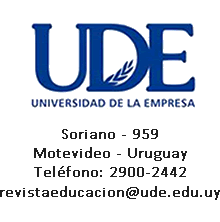Mapeo de publicaciones académicas sobre Inteligencia Artificial y Educación en Uruguay
DOI:
https://doi.org/10.48163/rseus.2025.13139-63Palabras clave:
Inteligencia Artificial, Educación, UruguayResumen
Si bien la incorporación de herramientas de Inteligencia Artificial al ámbito educativo no es reciente, no es hasta hace aproximadamente cinco años que dicha tecnología ha tenido una incorporación masiva en los procesos educativos, en todos los ámbitos y niveles. Conjuntamente con ello, a nivel mundial, las investigaciones y publicaciones sobre el vínculo entre Inteligencia Artificial y educación también han tenido un crecimiento exponencial. El objetivo del presente estudio es identificar las principales características que poseen las publicaciones académicas que se han realizado en Uruguay sobre el tema Inteligencia Artificial y educación. Para ello se ejecutó una metodología de revisión sistemática que dio por resultado final la identificación de siete documentos que se ajustaron a los criterios de selección definidos; tales documentos fueron sometidos a un proceso de codificación para la extracción de información y su posterior análisis. Los resultados de la investigación sugieren que las publicaciones sobre el tema Inteligencia Artificial y educación en Uruguay se encuentran en estado incipiente. Si bien hay intentos por abordar la cuestión, existen importantes vacíos que se encuentran sin ser atendidos por la investigación actual. En este sentido, identificamos que hay varias temáticas y ámbitos educativos específicos sobre los cuales existe escasa o nula publicación académica.
Descargas
Citas
Banco Interamericano de Desarrollo (2020). Usos y efectos de la inteligencia artificial en educación. https://publications.iadb.org/es/usos-y-efectos-de-la-inteligencia-artificial-en-educacion
Bloom, B. S. 1984. The 2 Sigma Problem: The search for methods of group instruction as effective as one-to-one tutoring. Educational Researcher, Vol. 13, no. 6, pp. 4–16.
Canbek, N.G., & M. E. Mutlu (2016). On the Track of Artificial Intelligence: Learning with Intelligent Personal Assistants. Journal of Human Sciences, 13(1), 592-601.
Carbonell, J. R. 1970. AI in CAI: An artificial-intelligence approach to computer-assisted instruction. IEEE Transactions on Man-Machine Systems, Vol. 11, No. 4, pp. 190–202.
Forero-Corba, W., & Negre Bennasar, F. (2024). Techniques and applications of Machine Learning and Artificial Intelligence in education: a systematic review. RIED-Revista Iberoamericana de Educación a Distancia, 27(1), pp. 209-253.
Horizon Report (2019). EDUCAUSE: Higher Education Edition. Louisville, CO: EDUCAUSE. https://library.educause.edu/resources/2019/4/2019-horizon-report
Luckin, R., W. Holmes, M. Griffiths y L. B. Forcier. (2016). Intelligence Unleashed: An argument for AI in Education. Londres: Pearson Education.
Marín, V. (2022). La revisión sistemática en la investigación en Tecnología Educativa: observaciones y consejos. RiiTE Revista interuniversitaria de investigación en Tecnología Educativa, 13, 62-79.
Newman, M., & Gough, D. (2020). Systematic Reviews in Educational Research: Methodology, Perspectives and Application. En O. Zawacki-Richter, M. Kerres, S. Bedenlier, M. Bond, y K. Buntins (Eds.), Systematic Reviews in Educational Research (pp. 3-22). https://link.springer.com/chapter/10.1007/978-3-658-27602-7_1
Organización de las Naciones Unidas para la Educación, la Ciencia y la Cultura (2021). Inteligencia artificial y educación. Guía para las personas a cargo de formular políticas. https://unesdoc.unesco.org/ark:/48223/pf0000379376
Organización de las Naciones Unidas para la Educación, la Ciencia y la Cultura (2019a). Consenso de Beijing sobre la inteligencia artificial y la educación. Documento final de la Conferencia Internacional sobre la Inteligencia Artificial y la Educación. Planificación de la educación en la era de la inteligencia artificial: dirigir los avances’. https://unesdoc.unesco.org/ark:/48223/pf0000368303
Organización de las Naciones Unidas para la Educación, la Ciencia y la Cultura (2019b). El aporte de la inteligencia artificial y las TIC avanzadas a las sociedades del conocimiento: una perspectiva de derechos, apertura, acceso y múltiples actores. https://unesdoc.unesco.org/ark:/48223/pf0000375796
Peña, C., J. Marzo, J. de la Rosa, R. Fabregat (2002). Un sistema de tutoría inteligente adaptativo considerando estilos de aprendizaje. Revista UIS ingenierías, 1(2), 17-29.
Zawacki-Richter, O., Kerres, M., Bedenlier, S., Bond, M., & Buntins, K. (Eds.). (2020). Systematic Reviews in Educational Research: Methodology, Perspectives and Application. https://link.springer.com/chapter/10.1007/978-3-658-27602-7_1
Publicado
Cómo citar
Número
Sección
Licencia
Derechos de autor 2025 Juan Manuel Sarochar

Esta obra está bajo una licencia internacional Creative Commons Atribución 4.0.
Política para revistas de acceso abierto
Los autores/as que publiquen en esta revista aceptan las siguientes condiciones:
a. Los autores/as conservan los derechos de autor y ceden a la revista el derecho de la primera publicación, con el trabajo registrado con la licencia de atribución de Creative Commons (CC-BY), que permite a terceros utilizar lo publicado siempre que mencionen la autoría del trabajo y a la primera publicación en esta revista.
b. Los autores/as pueden realizar otros acuerdos contractuales independientes y adicionales para la distribución no exclusiva de la versión del artículo publicado en esta revista (p. ej., incluirlo en un repositorio institucional o publicarlo en un libro) siempre que indiquen claramente que el trabajo se publicó por primera vez en esta revista.






















